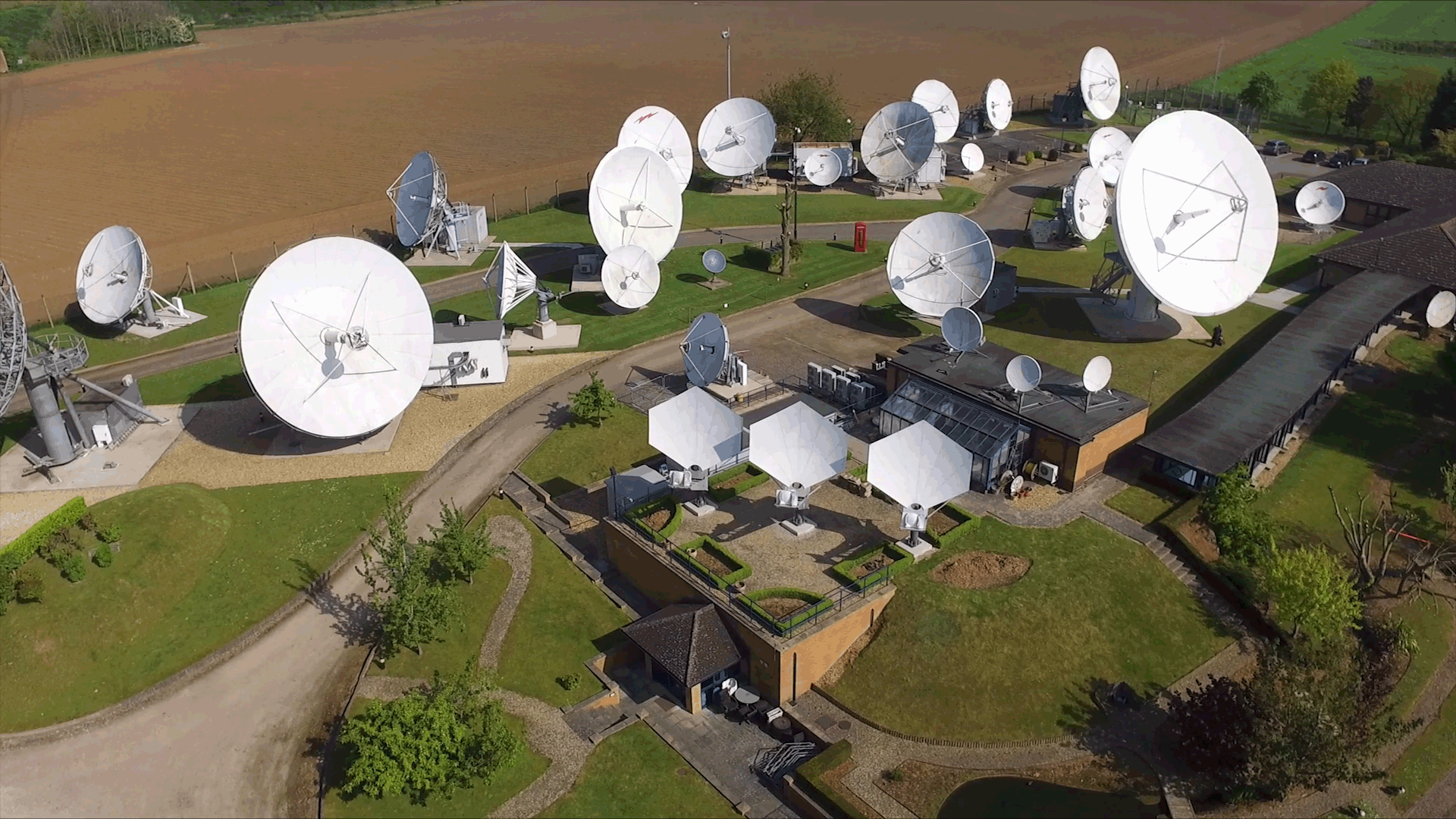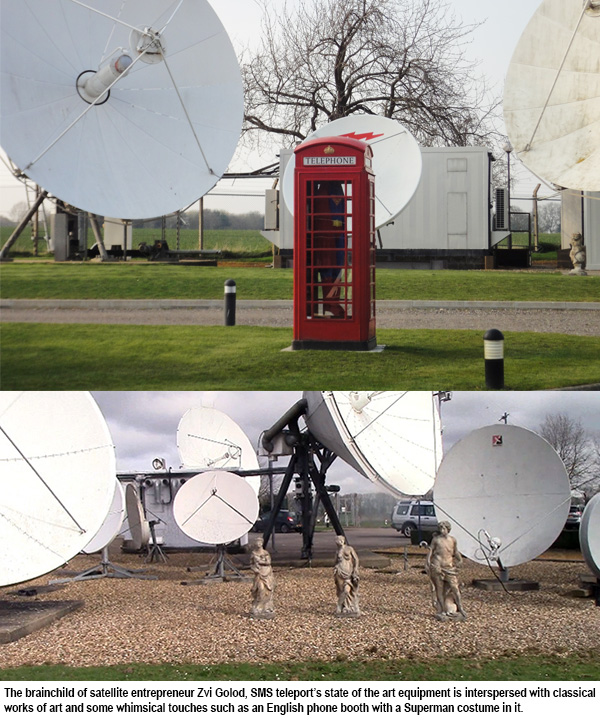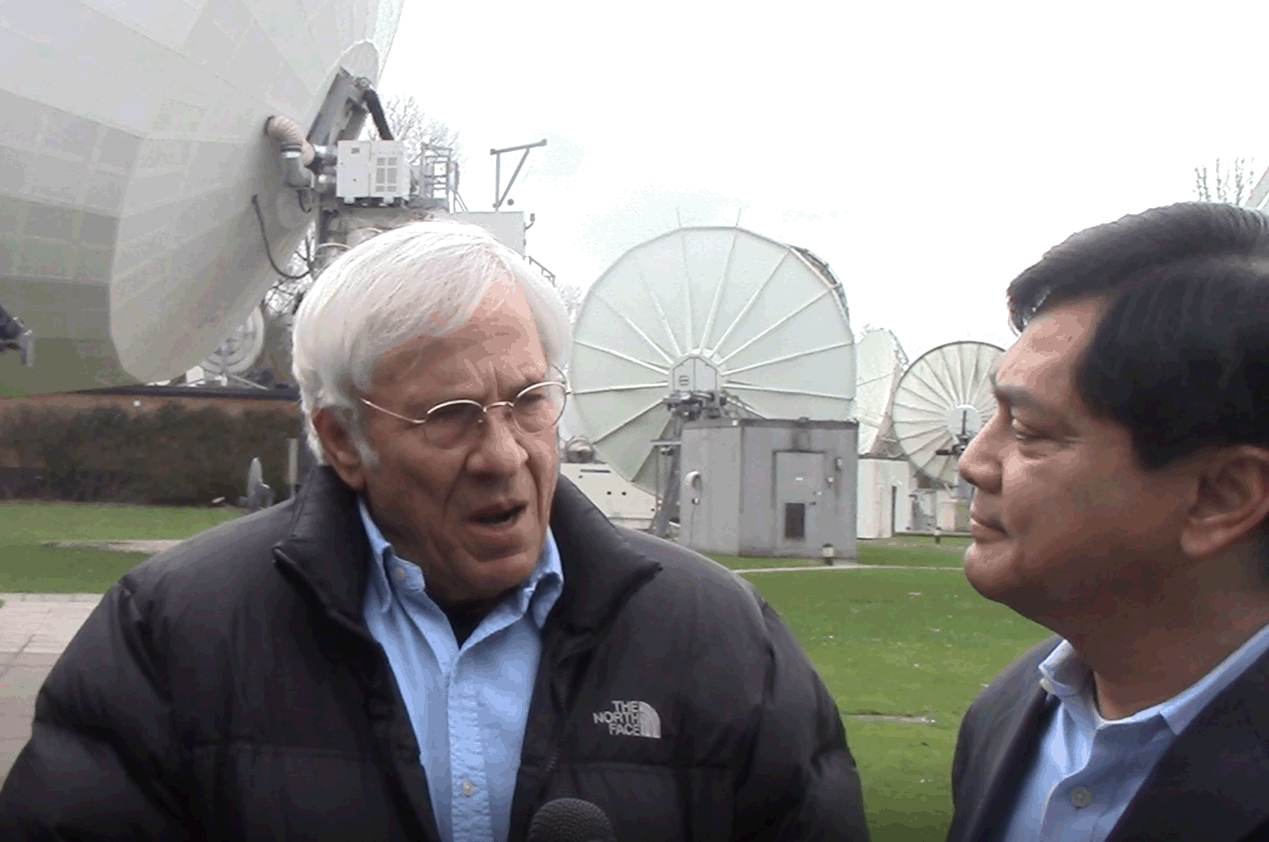A Beautiful Setting for a State of the Art Teleport
by Virgil Labrador, Editor-in-Chief
Rugby, UK, May 1, 2019 — Having worked at a teleport at the beginning of my career, I never miss an opportunity to visit one. Teleports remind me of the very exciting times I spent working in one. There is something about the mix of high technology and innovative, geeky engineers that never cease to amaze me, so when I was invited to visit a teleport in England I didn’t hesitate to accept. But nothing prepared me for what I was about to see…
The drive from the train station of Rugby in the Midlands region of England, near the historic town the historic town of Coventry and Shakespeare’s birthplace of Stratford-upon-Avon, took me through narrow rural roads with pastoral scenes of the beautiful English count

ryside. One would never think that a teleport would be in the vicinity but, just as we pass a quaint bed and breakfast, we enter the gates of what seems to be a beautifully landscaped garden with ponds where ducks and other wildlife roam freely. “Have we arrived in the teleport?” I asked my host. “Yes,” he replied. But on the outset this looks more like an aristocratic manor than a teleport. But a teleport it was. And a very sophisticated one at that!
I arrived in Satellite Mediaport Services’s (SMS) Lawford Heath Teleport-the brainchild of successful satellite entrepreneur Zvi Golod. A University of California Berkeley-trained engineer, Golod has over 35 years’ experience in the satellite industry where he founded such pioneering companies as Satlink and Skyvision, among others. Satlink was a provider of content distribution, management and playout services based in Israel. The company got its big break during the Iraq war in 1991, when Satlink was one of the few companies able to distribute signals from Iraq to various international news agencies. It then expanded into various content distribution services and operated a teleport. Skyvision was one of the first providers of internet via satellite services. Both companies were doing very brisk business in the 90s and 2000s, when an unfortunate hiking accident in 2007 rendered Golod out of commission for nearly a year. He then decided to sell his stake in the two companies, one to his partners and the other to an investment group. Golod could have retired then or moved on to other business areas but the satellite business has been his lifelong interest and he sought out his next venture.

He found in 2005 a small teleport formerly operated by MCI in Rugby. Golod saw huge potential in the beautifully landscaped facility built on top of a former Royal Air Force nuclear bunker. Only about an hour’s train ride from London, the teleport is strategically located where they can serve over 100 satellites from 60 degrees west to 60 degrees east. With exclusive, fully redundant network connectivity to multiple Points of Presence (PoP) in London and across the globe, the teleport can provide a variety of services all over Europe, the Middle East, Africa and even South America.
After selling his companies in 2008, Golod focused on developing the small teleport he just bought and rebranded it as Satellite Mediaport Services (SMS). Over the next few years SMS invested over 10 million dollars in upgrading the facility and installing state of the art equipment so that the teleport could support the new IP and other services required by their growing clientele.
Teleport Infrastructure
SMS has over forty antennas of various sizes including a 13-meter Ka-Band antenna being used as a Gateway for Arabsat’s Ka-Band broadband services. There is room for expansion for additional antennas as SMS has purchased additional land adjacent to the teleport.
 The teleport has fully redundant RF infrastructure for each antenna, backup uninterrupted power supply (UPS) and diesel generators, hot-swap-able components and automatic fail-over and load-balancing. Like most teleports, it is staffed 24/7, 365 days a year, working with the latest RF and monitoring equipment.
The teleport has fully redundant RF infrastructure for each antenna, backup uninterrupted power supply (UPS) and diesel generators, hot-swap-able components and automatic fail-over and load-balancing. Like most teleports, it is staffed 24/7, 365 days a year, working with the latest RF and monitoring equipment.
“What’s unique about our teleport is the business model that we have adopted. We do not cater to end-users, we do not compete with our clients. We serve satellite operators and service providers who know their business well. We support them and help them grow and take away all the headaches that comes with infrastructure from them. That way they can focus on selling their services while we take responsibility for all technical operations," said Golod. “We operate very efficiently and provide a cost-effective service that no one in the industry can compete with us and we pass on these savings to our clients,” he added.
Services
As a teleport, SMS provides traditional services that include:
- Transmission and reception;
- RF uplink and downlink;
- IP connectivity and backhaul;
- Conception, installation and operation of VSAT networks
- One-way or two-way Internet backbone connectivity via satellite;
- Network / Hub Hosting;
- Hosting / Maintenance of Customer Furnished Equipment (CFE)
- Satellite capacity;
- Worldwide lease line connections;
- DVBS2 + SCPC services;
- Data Storage and backup; and
- Collocation.
Among the services that the teleport is providing its clients include the collocation of a VSAT hub serving 150 bank branches throughout Africa. It is also providing maritime communication services that serve more than 700 ships at sea.
SMS is also providing SCPC and VSAT network management for large Internet Service Providers (ISPs)s in African countries such as Angola, Namibia and Nigeria.
An inveterate engineer who spends most of his time trying to solve problems and come up with innovative solutions for his clients, Golod is always thinking ahead in terms of new services that his teleport can provide. He’s very bullish about the new LEO constellations and says their teleport is ready for the new services that they will require. “The future is here, and we are ready to face the challenges required by these new services,” said Golod.
According to Golod, “having state of the art infrastructure is important in the teleport business but it’s the people that make the difference. We have been fortunate to have excellent engineering and support staff who are among the best in their field.” SMS also takes care of its employees with weekly social activities at the teleport. With a park-like setting, the teleport is ideal for many outdoor social activities. The company also provides a profit sharing plan where each employee has shares in the company.
Ready for the Future
Golod and his team has managed to build yet another successful teleport that he bought 12 years ago. He has considerably expanded the capabilities of the teleport by investing in new equipment and facilities and buying up additional land. He’s turned SMS into a successful enterprise and made it beautiful, too. When I asked him what’s his secret in starting and developing successful businesses, he said that he always tries to be one step ahead and see what lies beyond. While many teleports are struggling and some even not surviving the challenging market environment, it’s heartening to know that that there are still teleports that continue thrive in these changing times. The key to success seems to be to stay on top of technology, take care of your employees listen to your customers, provide a cost-effective and competitive product and it does not hurt to make it beautiful and aesthetically appealing as well.
 View a video of Virgil Labrador's visit to SMS Teleport, click here to view.
View a video of Virgil Labrador's visit to SMS Teleport, click here to view.
--------------------------------------
 Virgil Labrador is the Editor-in-Chief of Los Angeles, California-based Satellite Markets and Research which publishes a web portal on the satellite industry www.satellitemarkets.com, the monthly Satellite Executive Briefing magazine and occasional industry reports called MarketBriefs. Virgil is one of the few trade journalists who has a proven track record working in the commercial satellite industry. He worked as a senior executive for a teleport in Singapore, the Asia Broadcast Center, then-owned by the US broadcasting company CBS. He has co-authored two books on the history of satellite communications and satellite technology. He holds a Master’s in Communications Management from the University of Southern California (USC). He can be reached at virgil@satellitemarkets.com.
Virgil Labrador is the Editor-in-Chief of Los Angeles, California-based Satellite Markets and Research which publishes a web portal on the satellite industry www.satellitemarkets.com, the monthly Satellite Executive Briefing magazine and occasional industry reports called MarketBriefs. Virgil is one of the few trade journalists who has a proven track record working in the commercial satellite industry. He worked as a senior executive for a teleport in Singapore, the Asia Broadcast Center, then-owned by the US broadcasting company CBS. He has co-authored two books on the history of satellite communications and satellite technology. He holds a Master’s in Communications Management from the University of Southern California (USC). He can be reached at virgil@satellitemarkets.com.





